

Healthy people and Healthy plants
The health of 'homo sapiens' and 'plant life' are equally enhanced by a well nourished diet!
A good start makes a significant difference: good seed quality is the key start in life!
"Way back (50-60 years ago) I was farming with my father and we started to use Maxicrop as a foliar feed. Initially due to the persuasion of an old school (Judd at Tonbridge) friend of Dad's - one Dennis Longhurst, and after several visits and leaning on the 'old school friend' personna, "Dad ordered some" - well I was still using Maxicrop when I sold up and started a new life in the 1990's"
The benefits of foliar feed was clear then, and since then many more foliar feeds have become available and now sophisticated biostimulants have been developed 'stimulating' the efficient uptake of nutrients.
In this week's Journal my friend Mike Stoker who has been involved in the technical aspects/benefits of plant nutrients & Biostimulants for more than 20 years, reviews the products of ORION.
Biostimulants offer boost for cherry grower
Mike Stoker - ORION Future Technology Agronomist
Mike Stoker reviews the performance of Biostimulants at Lower Hope Cherries in Herefordshire which has been improving the resilience of its cherry, raspberry and apple crops by using a selection of biostimulants in a move to become more sustainable and less reliant on chemicals.
Grower manager, Harry Skittery, explains that since first planting fruit crops in 1999 the fruit business, which is part of a larger estate, has been keen to improve its soil health and the growing potential of its crops.
"We grow 36 hectares of cherries, 7 of raspberries and 6 of apples. The estate extends to 574 hectares, with arable crops, livestock and a significant woodland area too.
"Like most we have to overcome climatic, pest and disease problems. However, in recent years it has become apparent that we can achieve this with minimal use of chemical products," he says.
As agrochemicals have lost certification for UK use, the estate has looked for innovative solutions which potentially could have a consequential effect of ameliorating pests resulting from producing a healthy crop.
"It was a case of how to produce the crop in a long term and sustainable way. Our objective was to improve the crop's environmental resilience thereby reducing our reliance on conventional chemistry, whilst growing quality fruit with a good shelf life," says Mr Skittery.
An early season pest was found to be unique to the estate. Pear Thrip, along with other penetrative pests, posed a concern that led us to adopt an alternative sustainable strategy to improve the strength of the 36 hectares of cherry trees.
"Silicon improves leaf hair density, making the trees less appealing to biting insects like Pear Thrip. We also believe the product has a secondary benefit and helped to reduce damage caused by other pests like Cherry Blackfly," he says.
Below: left. Pear Thrips and right. Cherry Blackfly
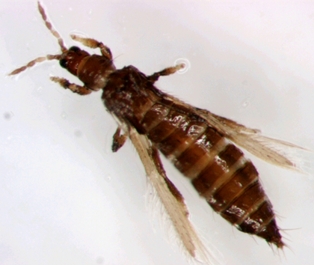
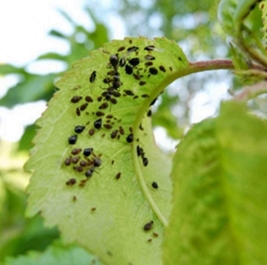
Starting small and scaling up enabled the farm to establish that trees treated with Sirius were able to take up more silicon and became both visually and structurally. Subsequently Sirius has been rolled out to other crops including apple trees and raspberries.
Heavy clay loam soils on the estate provide good nutrient retention and Mr Skittery has treated the soils with composts to further boost this"
"The soil has good drought resistant qualities but on occasion can suffer cracking. This is partly overcome with compost which also acts as a soil organic matter conditioner. However, with the heavy rain of recent seasons, we have also improved drainage to help soil structure in the wetter months," he says.
The rich soil holds the crop well too, providing good nutrient retention for the foliar and fertigation programs he has developed with biostimulants specialist Orion FT.
"Working with Mike Stoker, one of Orion's agronomists, we have developed a foliar mix which supplements our calcium and nitrogen program. This includes Sirius to boost silicon uptake, Trident which provides additional copper and zinc, and Rigel to improve plant resilience," he says.
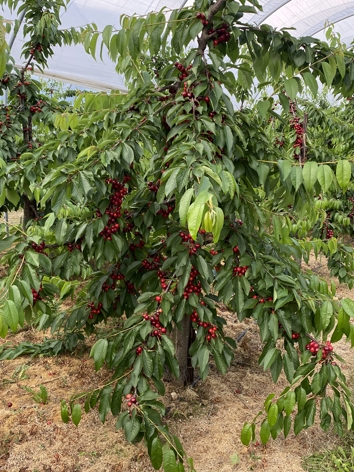 Disease is also a constant threat to the cherry crop, which includes Sweetheart, Kordia, Regina, Corina, and old varieties such as Lapins and Summer Sun.
Disease is also a constant threat to the cherry crop, which includes Sweetheart, Kordia, Regina, Corina, and old varieties such as Lapins and Summer Sun.
"Bacterial canker is an ongoing concern. If we have open wounds which are susceptible to canker, we have used Trident early and late in the season to try and prevent infection. We can't use copper feed as an eradicate but we can use it as a preventative measure, which is also where Trident has been effective," he says.
The farm has instigated a post-harvest foliar program with Trident which is followed by a liquid copper foliar feed.
"We have a period where we take the skins off, and using Trident helps to protect the tree. We can also use it if we experience buds breaking early in the season," he adds.
The two main diseases during the growing season, Botrytis and Brown Rot, are still conventionally controlled with a fungicide rotation, such as Switch, Signum, and Teldor. Amylo-X, a bio-fungicide, has also been brought into the mix to help combat both diseases, and has been working well, alongside Sirius.
"We have used silicon applications, alongside our conventional program, to strengthen and thicken cell walls, in order hinder penetration from fungal hyphae," he says.
A new disease, apiognomonia, causes leaf blotch which can transfer to the cherry itself and has affected the estate's Sweetheart variety.
"I have read articles where tebuconazole was used with good effect in previous years on the continent. However, this is not authorised on UK cherries, so we are limited on what we can use," he says.
Having considered the options available to the farm he believes the main way to combat apiognomonia is with myclobutanil. However, the myclobutanil product Synsthane is likely to lose authorisation soon.
"In light of the upcoming changes we are looking at new ways to combat apiognomonia. Preferably through cost effective measures such as chemical or biostimulant enhanced resilience," he adds.
Observations from previous growing seasons has identified that cherry plant stalks maintain freshness and green integrity longer, which has helped to extend the shelf life of the fruit.
"We know the quality and shelf life of the cherries is better and there is a reduction in cherry rot. The cherry market being as it is means we are rolling over stock more towards 7-8 days before it hits the shop shelf, so fruit integrity is paramount," he says.
The estate's ethos is to grow for quality not quantity. However, a respectable 450 tonnes of cherries are harvested per year.
"Since the conception of Lower Hope Fruit Ltd, our main aim is to grow and harvest quality, something very important to our owners Mr and Mrs Richards. There can be scope for more tonnage however, if the season is favourable," he adds.
The fruit treated with the biostimulants has shown enhanced nutrient and calcium levels. This has meant healthier fruit that lasts longer without splitting. A benefit he believes is attributed to thicker cell walls.
"The skin of the fruit is stronger, more resilient, and splitting has been significantly reduced. Improved silicon uptake is key to this, and it has provided us with a sustainable option to use alongside our calcium foliar and fertigation programs," he concludes.
Mike Stoker summarises:
"From a personal perspective I have worked closely with all the team at Lower Hope Fruit for over 10 years I have always been impressed by the unity of the team and their ability to embrace new ideas, with such a positive attitude towards adopting less conventional best practice agronomy, which can support crops to tolerate greater environmental pressures - Woody perennials such as Cherry trees are powerful 'sequesters' of carbon too, a process which involves the removal of excess carbon dioxide from the atmosphere and storing it in the soil organic matter and above ground in a plant's biomass by the action of photosynthesis - documented evidence indicates that phytoliths (silica structures formed in roots, stem and leaves) are associated with the molecules that contain carbon, such as cellulose and proteins, these degrade slowly and therefore constitute an important silica-carbon sink, adopting this agronomic approach ensures they play a major role as a long term more sustainable and efficient food producer in the UK".
Below: Healthy trees and luscious cherries at Lower Hope
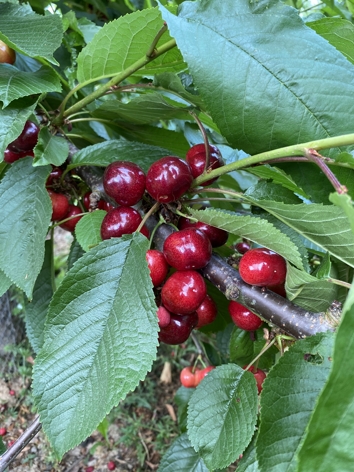
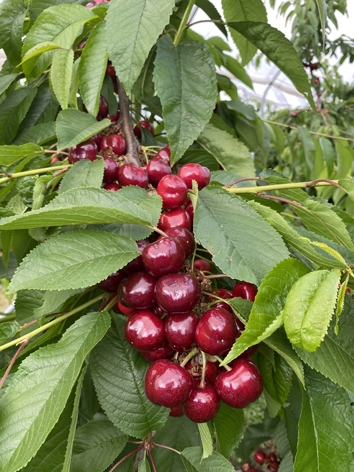
Click on Lower Hope Fruit for an understanding of the scale of fruit production at Lower Hope Farms.
Click on Lower Hope Estate for an overview of all the estate has to offer!
![]() That is all for this week
That is all for this week
Take care
The English Apple Man